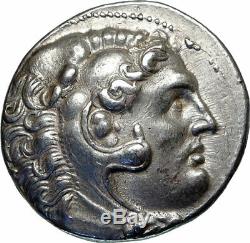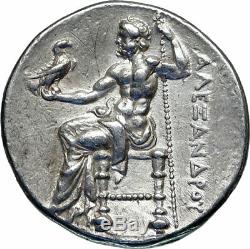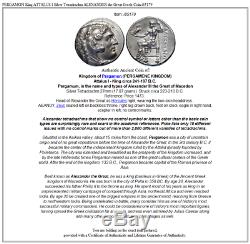PERGAMON King ATTALUS I Silver Tetradrachm ALEXANDER the Great Greek Coin i85179





Item: i85179 Authentic Ancient Coin of. (PERGAMENE KINGDOM) Attalus I - King circa 241-197 B. Pergamum, in the name and types of Alexander III the Great of Macedon Silver Tetradrachm 27mm (17.07 grams) Struck circa 223-210 B. Head of Alexander the Great as Hercules.
Right, wearing the lion-skin headdress. Seated left on backless throne, right leg drawn back, feet on stool, eagle in right hand, scepter in left; no control marks. Alexander tetradrachms that show no control symbol or letters other than the basic coin types are surprisingly rare and scant in the academic references. Price lists only 10 different issues with no control marks out of more than 2,000 different varieties of tetradrachms. Situated in the Kaikos valley, about 15 miles from the coast, Pergamon was a city of uncertain origin and of no great importance before the time of Alexander the Great.In the 3rd century B. It became the center of the independent kingdom ruled by the Attalid dynasty founded by Philetairos. The city was extended and beautified as the prosperity of the kingdom increased, and by the late Hellenistic times Pergamon ranked as one of the great cultural centers of the Greek world. After the end of the kingdom, 133 B. Pergamon became capital of the Roman province of Asia.
Best known as Alexander the Great , he was a king (basileus in Greek) of the Ancient Greek kingdom of Macedonia. He was born in the city of Pella in 356 BC.
By age 20, Alexander succeeded his father Philip II to the throne as king. He spent most of his years as king in an unprecedented military campaign of conquest through Asia, northeast Africa and even reached India. By age 30 he created one of the biggest empires in the ancient world, reaching from Greece to northwestern India. Being undefeated in battle, many consider him as one of history's most successful military commanders. He could be considered one of history's most important figures, having spread the Greek civilization far and wide, and was even admired by Julius Caesar along with many other important historical personages as well.Attalus I , surnamed Soter ("Savior"; 269-197 BC) ruled Pergamon, an Ionian Greek polis (what is now Bergama, Turkey), first as dynast, later as king, from 241 BC to 197 BC. He was the first cousin once removed and the adoptive son of Eumenes I, whom he succeeded, and was the first of the Attalid dynasty to assume the title of king in 238 BC. He was the son of Attalus and his wife Antiochis.
Attalus won an important victory over the Galatians, newly arrived Celtic tribes from Thrace, who had been, for more than a generation, plundering and exacting tribute throughout most of Asia Minor without any serious check. This victory, celebrated by the triumphal monument at Pergamon (famous for its Dying Gaul) and the liberation from the Gallic "terror" which it represented, earned for Attalus the name of "Soter", and the title of "king". A courageous and capable general and loyal ally of Rome, he played a significant role in the first and second Macedonian Wars, waged against Philip V of Macedon. He conducted numerous naval operations, harassing Macedonian interests throughout the Aegean, winning honors, collecting spoils, and gaining for Pergamon possession of the Greek islands of Aegina during the first war, and Andros during the second, twice narrowly escaping capture at the hands of Philip.
Attalus was a protector of the Greek cities of Anatolia and viewed himself as the champion of Greeks against barbarians. During his reign he established Pergamon as a considerable power in the Greek East. He died in 197 BC, shortly before the end of the second war, at the age of 72, having suffered an apparent stroke while addressing a Boeotian war council some months before.
He and his wife were admired for their rearing of their four sons. He was succeeded as king by his son Eumenes II. Alexander III of Macedon (20/21 July 356 BC - 10/11 June 323 BC), commonly known as Alexander the Great , was a king (basileus) of the Ancient Greek kingdom of Macedon and a member of the Argead dynasty. Born in Pella in 356 BC, Alexander succeeded his father, Philip II, to the throne at the age of twenty. He spent most of his ruling years on an unprecedented military campaign through Asia and northeast Africa, and by the age of thirty he had created one of the largest empires of the ancient world, stretching from Greece to northwestern India. He was undefeated in battle and is widely considered one of history's most successful military commanders. During his youth, Alexander was tutored by the philosopher Aristotle until the age of 16. After Philip's assassination in 336 BC, Alexander succeeded his father to the throne and inherited a strong kingdom and an experienced army.Alexander was awarded the generalship of Greece and used this authority to launch his father's Panhellenic project to lead the Greeks in the conquest of Persia. In 334 BC, he invaded the Achaemenid Empire, and began a series of campaigns that lasted ten years. Following the conquest of Asia Minor, Alexander broke the power of Persia in a series of decisive battles, most notably the battles of Issus and Gaugamela. He subsequently overthrew the Persian King Darius III and conquered the Achaemenid Empire in its entirety.
At that point, his empire stretched from the Adriatic Sea to the Indus River. Seeking to reach the "ends of the world and the Great Outer Sea", he invaded India in 326 BC, but eventually turned back at the demand of his homesick troops.
Alexander died in Babylon in 323 BC, the city he planned to establish as his capital, without executing a series of planned campaigns that would have begun with an invasion of Arabia. In the years following his death, a series of civil wars tore his empire apart, resulting in several states ruled by the Diadochi, Alexander's surviving generals and heirs. Alexander's legacy includes the cultural diffusion his conquests engendered, such as Greco-Buddhism. He founded some twenty cities that bore his name, most notably Alexandria in Egypt. Alexander's settlement of Greek colonists and the resulting spread of Greek culture in the east resulted in a new Hellenistic civilization, aspects of which were still evident in the traditions of the Byzantine Empire in the mid-15th century and the presence of Greek speakers in central and far eastern Anatolia until the 1920s. Alexander became legendary as a classical hero in the mold of Achilles, and he features prominently in the history and mythic traditions of both Greek and non-Greek cultures. He became the measure against which military leaders compared themselves, and military academies throughout the world still teach his tactics. He is often ranked among the most influential people in human history, along with his teacher Aristotle. Pergamon was a rich and powerful ancient Greek city in Aeolis.It is located 26 kilometres (16 mi) from the modern coastline of the Aegean Sea on a promontory on the north side of the river Caicus (modern-day Bakrçay) and northwest of the modern city of Bergama. Many remains of its impressive monuments can still be seen and especially the outstanding masterpiece of the Pergamon Altar. It became the capital of the Kingdom of Pergamon during the Hellenistic period under the Attalid dynasty in 281-133 BC. Pergamon is cited in the Book of Revelation as one of the seven churches of Asia.
Xenophon provides the earliest surviving documentary mention of Pergamon. Captured by Xenophon in 399 BC and immediately recaptured by the Persians, it was severely punished in 362 BC after a revolt. It did not become important until Lysimachus, King of Thrace, took possession in 301 BC, but soon after his lieutenant Philetaerus enlarged the town, the kingdom of Thrace collapsed and it became the capital of the new kingdom of Pergamon which Philetaerus founded in 281 BC, beginning the Attalid dynasty. In 261 BC he bequeathed his possessions to his nephew Eumenes I (263-241 BC), who increased them greatly, leaving as heir his cousin Attalus I (241-197 BC). The Attalids became some of the most loyal supporters of Rome in the Hellenistic world.
Under Attalus I (241-197 BC), they allied with Rome against Philip V of Macedon, during the first and second Macedonian Wars, and again under Eumenes II (197-158 BC), against Perseus of Macedon, during the Third Macedonian War. For their support against the Seleucids, the Attalids were rewarded with all the former Seleucid domains in Asia Minor. As a consequence of its rise to power, the city expanded greatly.
Until 188 BC, it had not grown significantly since its founding by Philetaerus, and covered c. After this year, a massive new city wall was constructed, 4 kilometres (2.5 mi) long and enclosing an area of approximately 90 hectares (220 acres). The Attalids ruled with intelligence and generosity. They allowed the Greek cities in their domains to maintain nominal independence.
They sent gifts to Greek cultural sites like Delphi, Delos, and Athens. They defeated the invading Celts. They remodeled the Acropolis of Pergamon after the Acropolis in Athens.
When Attalus III (138-133 BC) died without an heir in 133 BC, he bequeathed the whole of Pergamon to Rome in order to prevent a civil war. Not everyone in Pergamon accepted Rome's rule. Aristonicus, who claimed to be Attalus' brother as well as the son of Eumenes II, an earlier king, led a revolt among the lower classes with the help of Blossius, a famous Stoic philosopher. Aristonicus took the regal name Eumenes III. For a period he enjoyed success, defeating and killing the Roman consul P. Licinius Crassus and his army. However, his revolt was put down in 129 BC by the consul M.Perperna, and Aristonicus was executed in Rome. After this, Pergamon was divided by Perperna's successor, M'. Aquillius, among Rome, Pontus, and Cappadocia. Pergamon was briefly the capital of the Roman province of Asia, before the capital was transferred to Ephesus. After a slow decline, the city was favored by several imperial initiatives under Hadrian (117 - 138).
It was granted the title of metropolis and as a result of this an ambitious building program was carried out: massive temples, a stadium, a theatre, a huge forum and an amphitheatre were constructed. In addition, at the city limits the shrine to Asclepius (the god of healing) was expanded into a lavish spa. This sanctuary grew in fame and was considered one of the most famous therapeutic and healing centers of the Roman world. Galen, after Hippocrates the most famous physician of antiquity, was born at Pergamon and received his early training at the Asclepeion.Pergamon reached the height of its greatness under Roman Imperial rule and was home to about 200,000 inhabitants. The city was an early seat of Christianity and was granted a bishopric by the 2nd century. The city suffered badly during the third century and was badly damaged by an earthquake in 262 and was sacked by the Goths shortly after. The Library of Pergamon was renowned, and second only to the Library of Alexandria, although not approaching Alexandria in scholarship.
World-renowned expert numismatist, enthusiast, author and dealer in authentic ancient Greek, ancient Roman, ancient Byzantine, world coins & more. Ilya Zlobin is an independent individual who has a passion for coin collecting, research and understanding the importance of the historical context and significance all coins and objects represent. Send me a message about this and I can update your invoice should you want this method. Getting your order to you, quickly and securely is a top priority and is taken seriously here.
Great care is taken in packaging and mailing every item securely and quickly. What is a certificate of authenticity and what guarantees do you give that the item is authentic? You will be very happy with what you get with the COA; a professional presentation of the coin, with all of the relevant information and a picture of the coin you saw in the listing. Additionally, the coin is inside it's own protective coin flip (holder), with a 2x2 inch description of the coin matching the individual number on the COA.
Whether your goal is to collect or give the item as a gift, coins presented like this could be more prized and valued higher than items that were not given such care and attention to. When should I leave feedback?
Please don't leave any negative feedbacks, as it happens sometimes that people rush to leave feedback before letting sufficient time for their order to arrive. The matter of fact is that any issues can be resolved, as reputation is most important to me. My goal is to provide superior products and quality of service. How and where do I learn more about collecting ancient coins?Visit the "Guide on How to Use My Store". For on an overview about using my store, with additional information and links to all other parts of my store which may include educational information on topics you are looking for. The item "PERGAMON King ATTALUS I Silver Tetradrachm ALEXANDER the Great Greek Coin i85179" is in sale since Tuesday, July 14, 2020. This item is in the category "Coins & Paper Money\Coins\ Ancient\Greek (450 BC-100 AD)". The seller is "highrating_lowprice" and is located in Rego Park, New York.
This item can be shipped worldwide.- Culture: Greek
- Coin Type: Ancient
- Geographic Origin: Ancient Greece
- Era: Ancient Greece
- Material: Silver
- Composition: Silver
- Denomination: Tetradrachm


